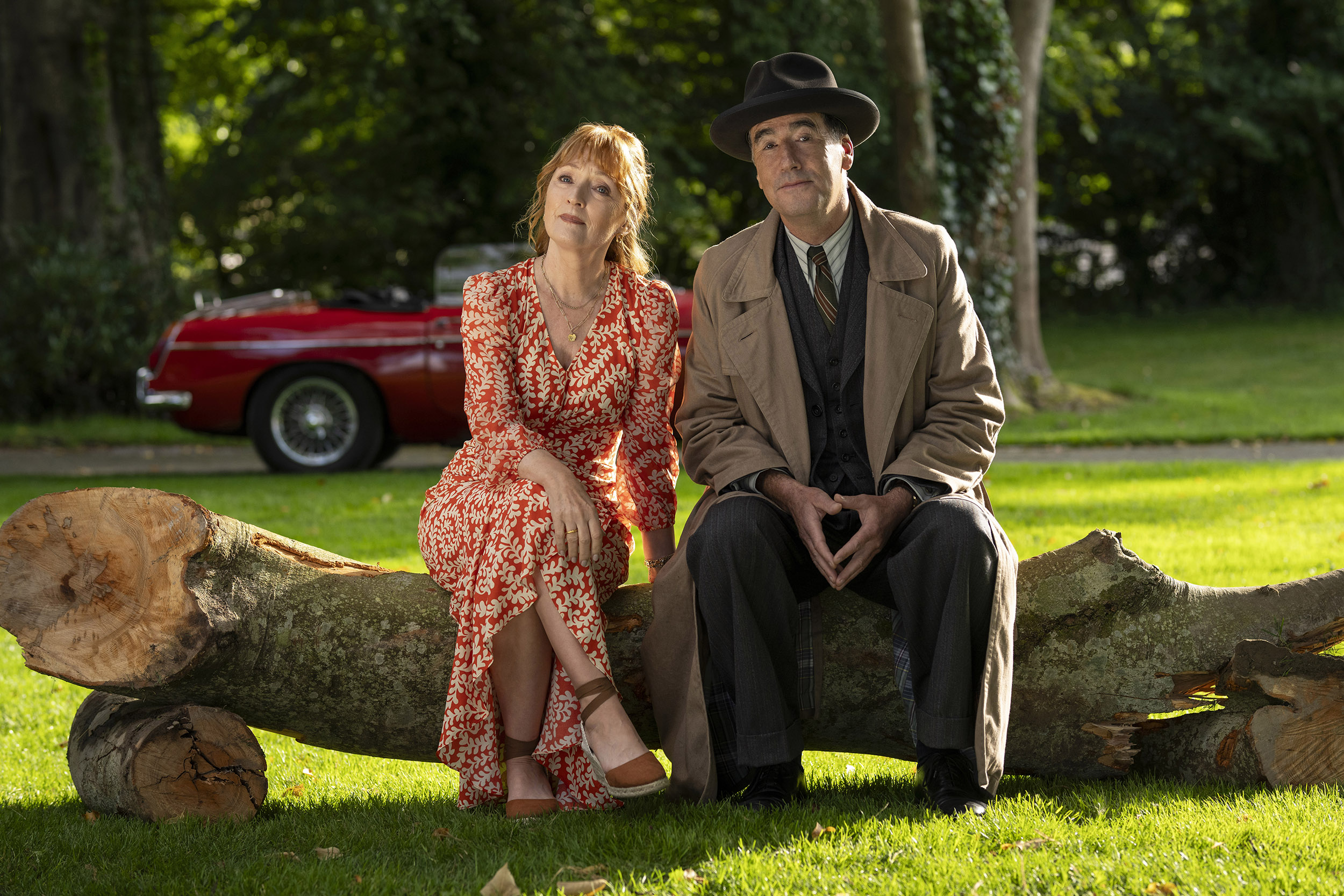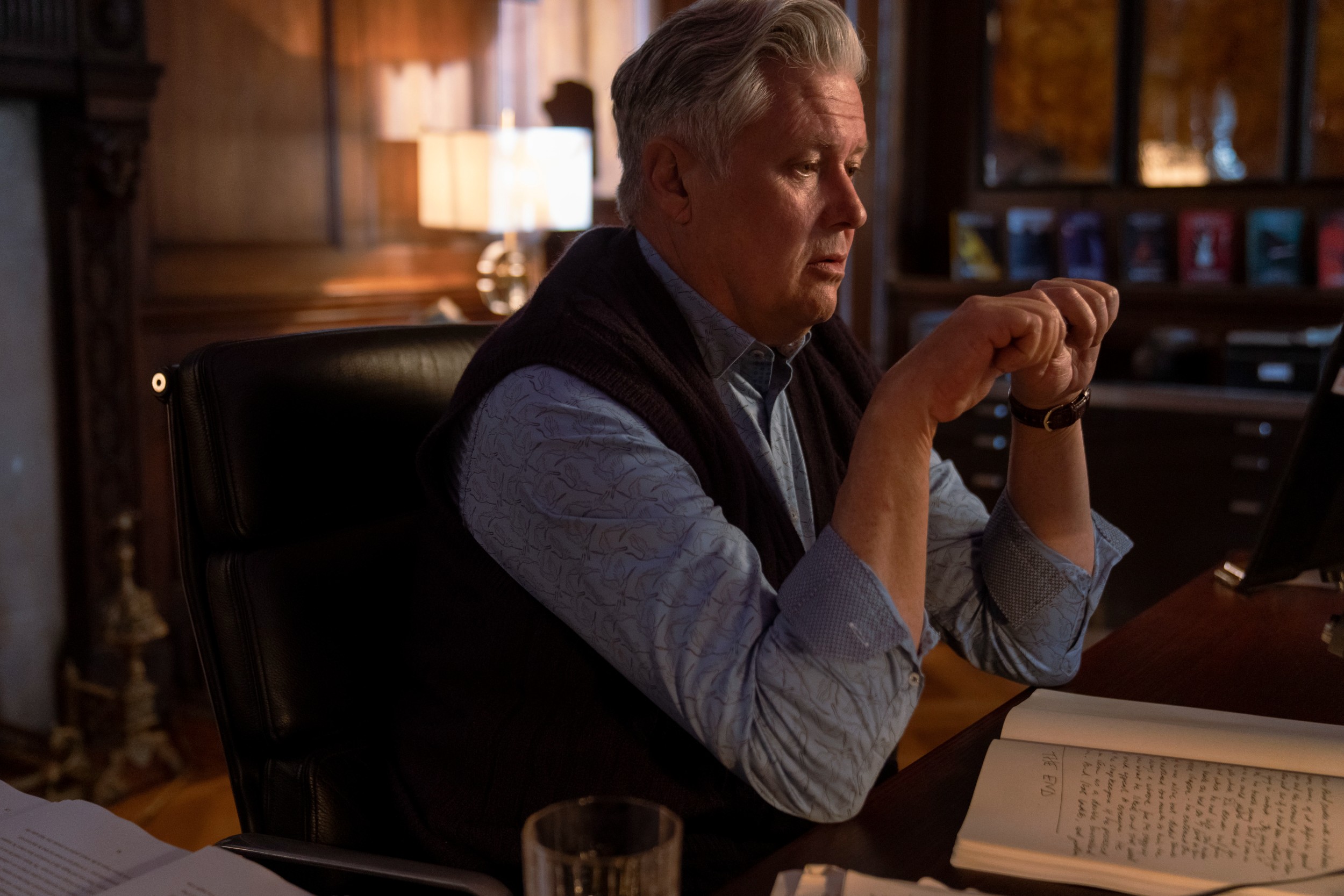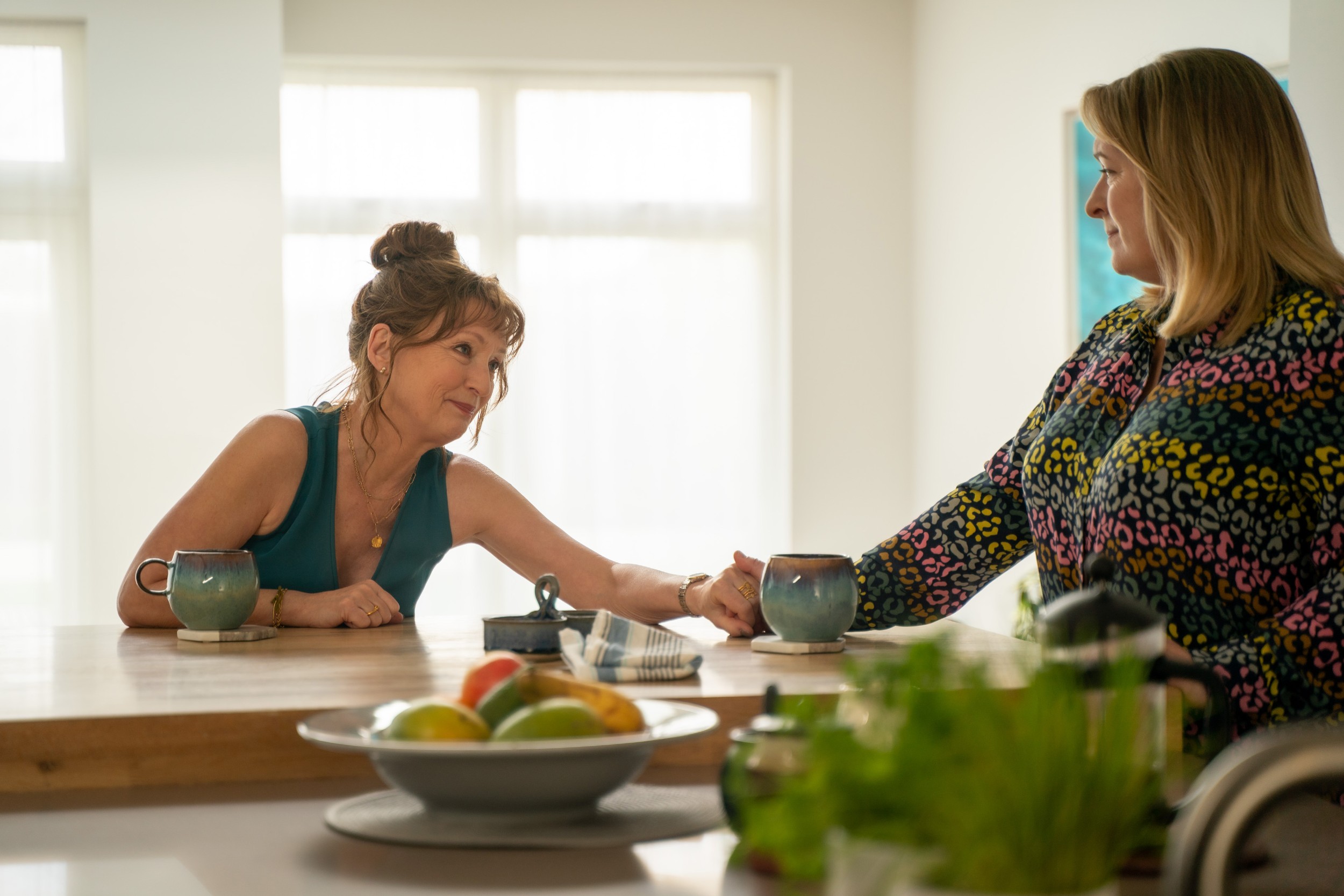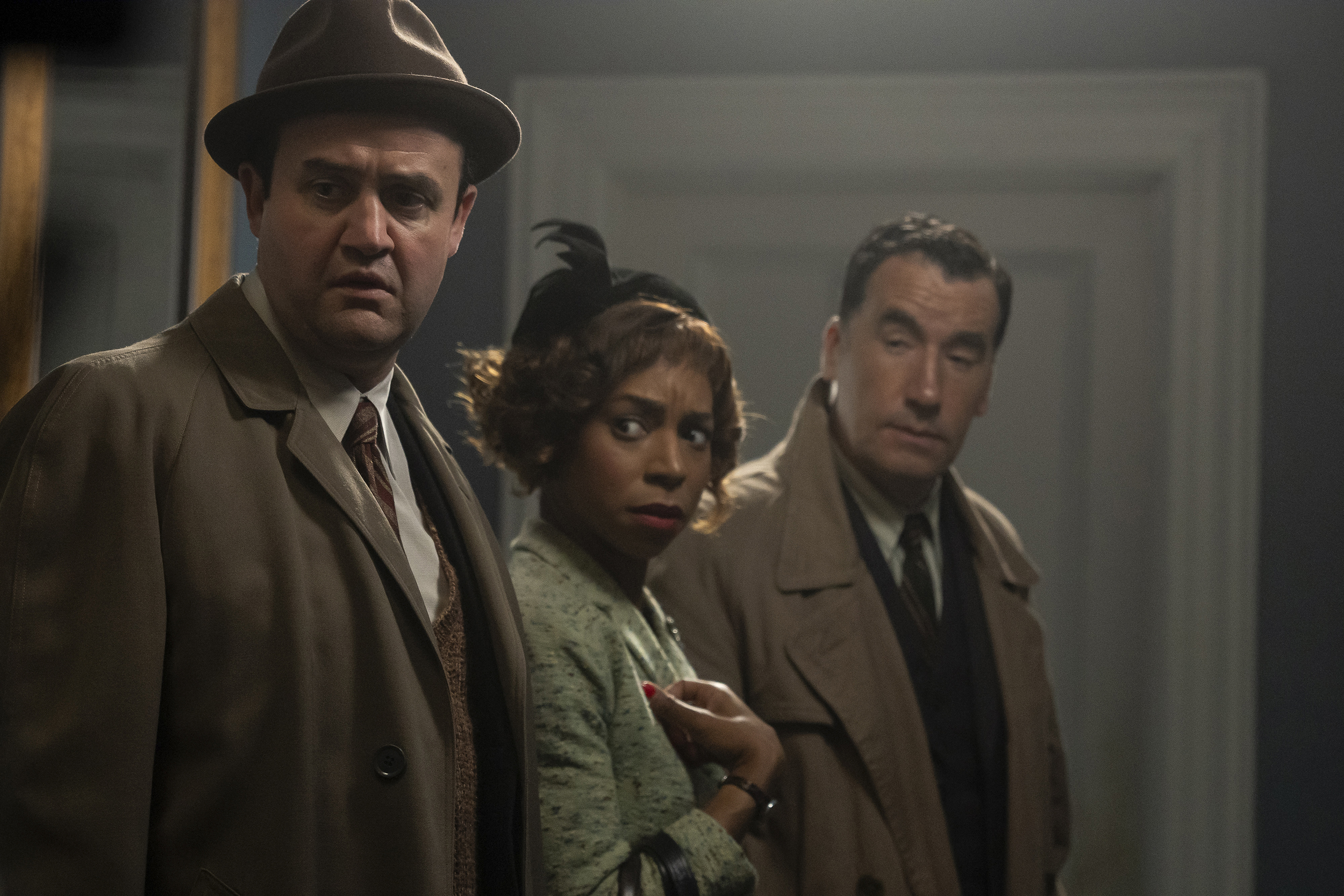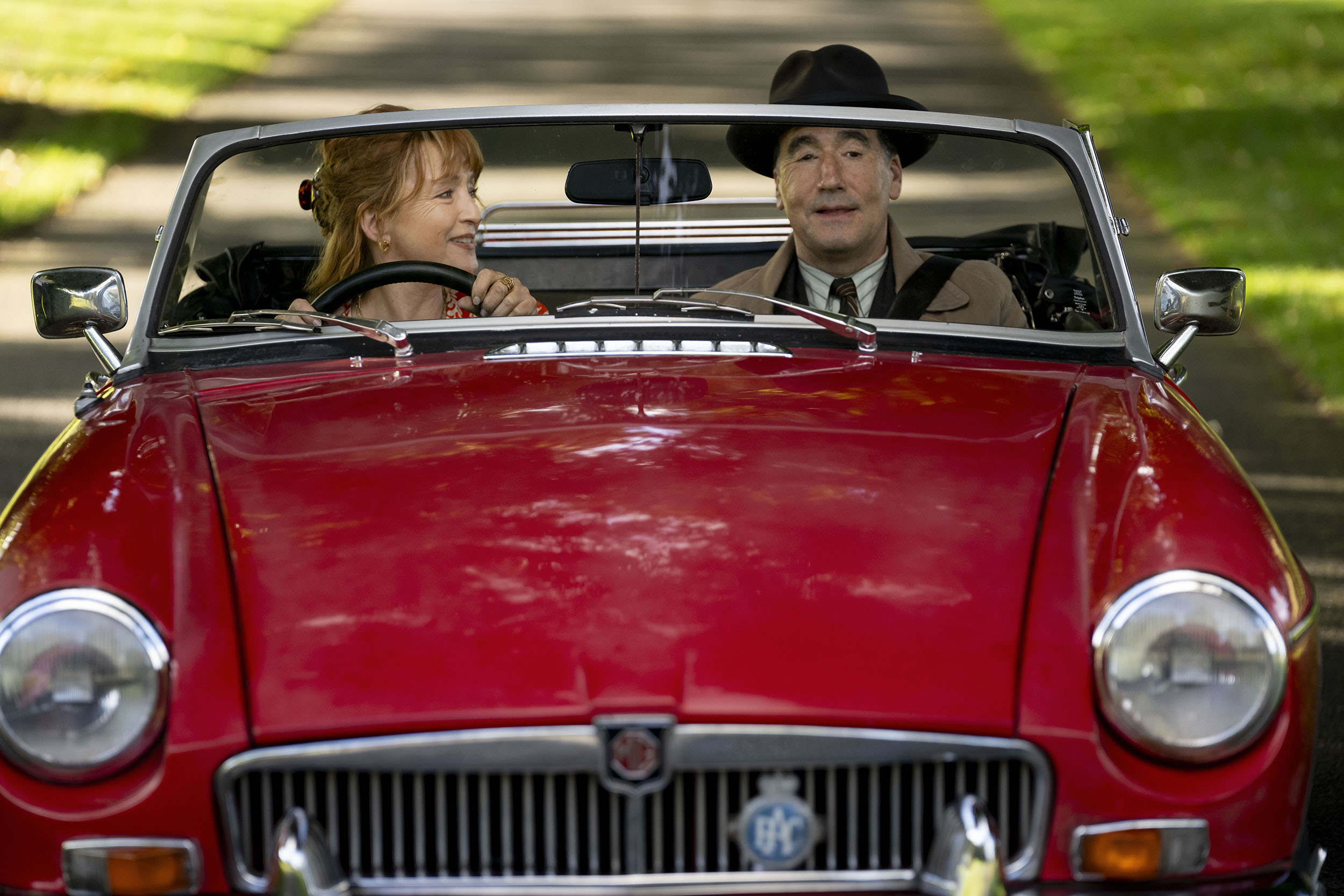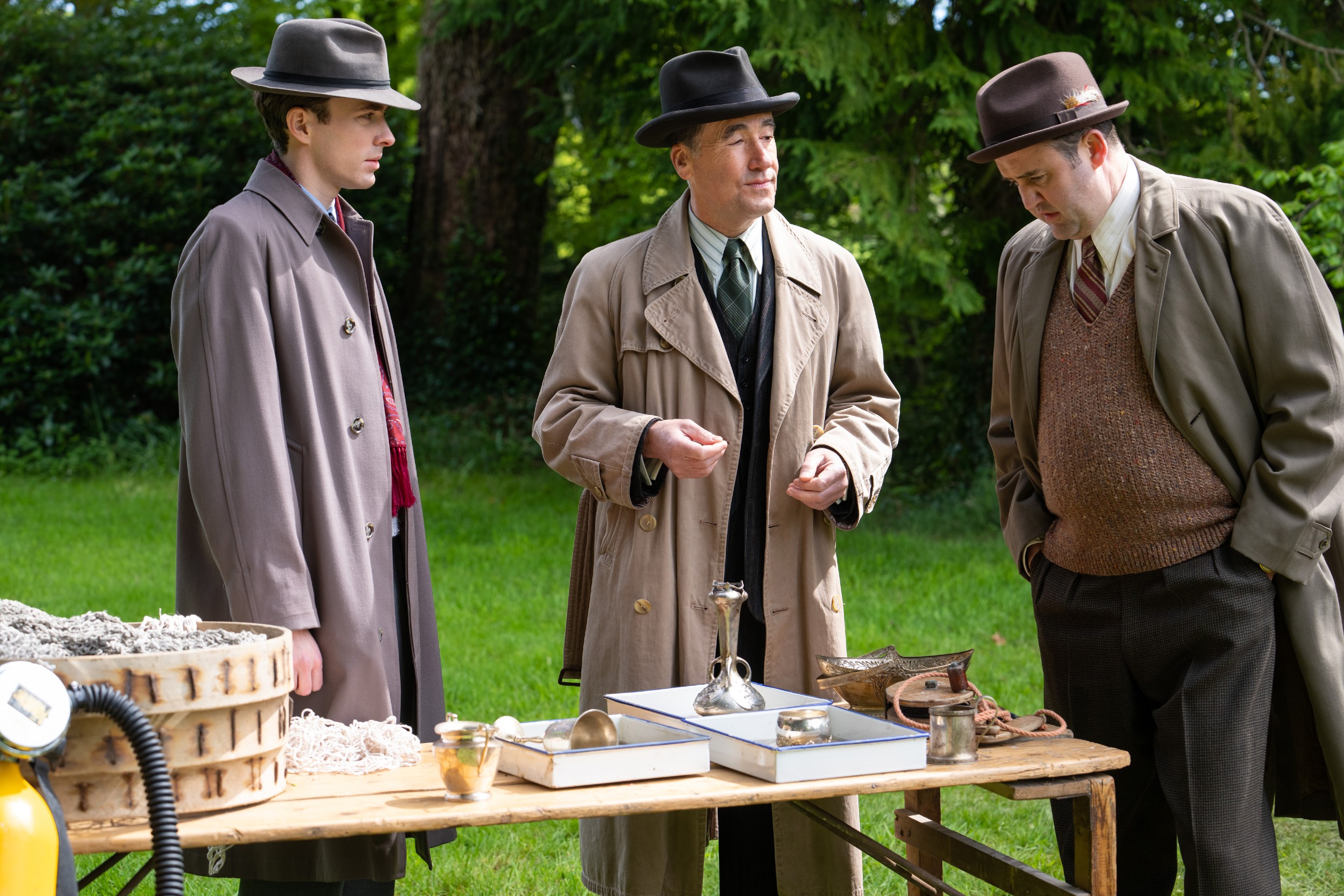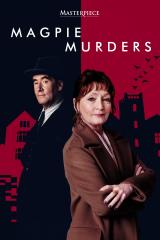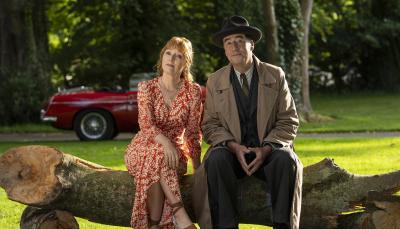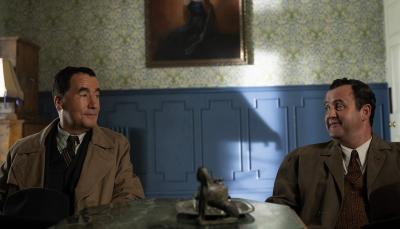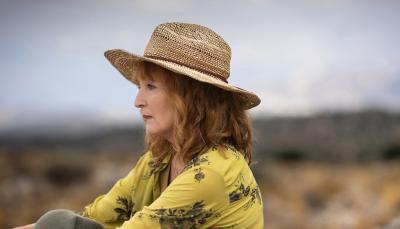Talking Meta Fiction & Inspiration with Writer/Creator Anthony Horowitz
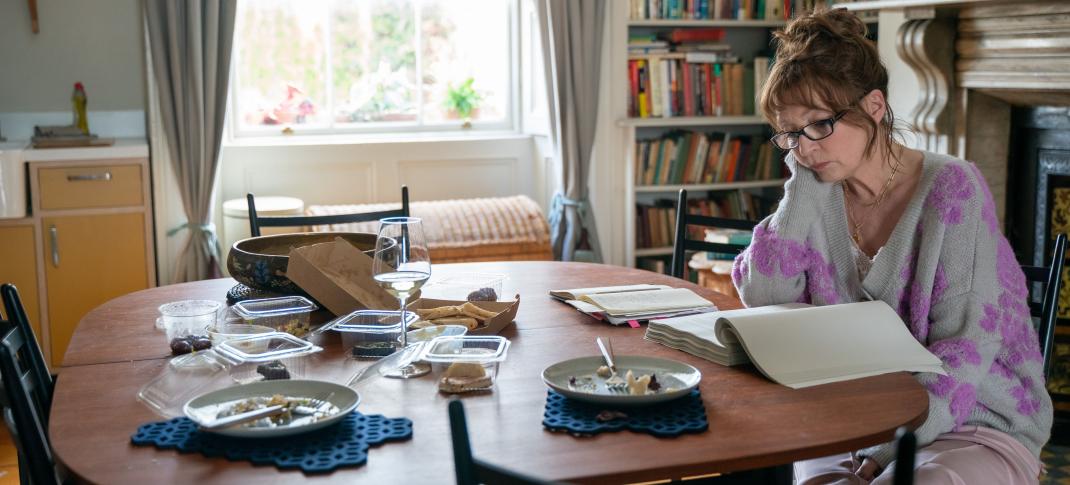
Lesley Manville as Susan Ryeland in 'Magpie Murders'
© Eleventh Hour Films
Whether you read his books or were introduced to shows he created like Collision or Foyle’s War, Anthony Horowitz is a name you should recognize. His early YA titles led to writing the explosively popular teen spy series known as the Alex Rider novels, which he later adapted to television. In between writing novels, he wrote for countless shows such as Agatha Christie’s Poirot and Midsomer Murders. After writing official novels for the Sherlock Holmes and James Bond universes, he followed up with Magpie Murders in 2016, which he developed into a hit series for Masterpiece in 2022. With its sequel – the new season – Moonflower Murders, Horowitz continues the story of editor-turned-reluctant-detective Susan Ryeland (Lesley Manville).
Both the novels and the two television seasons occupy the land of meta-fiction: A treatise on murder mysteries through the mechanism of a story within a story. Susan Ryeland must use the 1955 fictional world of private detective Atticus Pünd (Tim McMullen) and the murders he attempts to solve to illuminate clues and investigate mysteries in her present-day, real world. Making things more interesting, Susan interacts with Pünd; he appears in her life to help her think through each puzzle. They have rich exchanges and a meaningful friendship, despite his imagined existence.
Telly Visions spoke with writer, creator, and all-around good guy Anthony Horowitz about Moonflower Murders, creating meta-fiction, and the upcoming third novel in the Susan Ryeland series.
This interview has been edited and condensed for clarity.
TV: In the press release, you mentioned that Moonflower Murders has something you’ve never done before in a murder mystery. Can you talk about that without giving the game away?
AH: Whenever I write a new book, I try to do things differently. But I’m afraid I can’t tell you, because it will give the game away. When doing interviews, it’s an absolute irritation that I cannot tell you what I’m proudest of. But when you get to the last episode, you will see what you might call my Citizen Kane moment. It does something that has never been done before, and I hope it will make you smile.
TV: Were you avoiding or leaning into any particular tropes when creating the novels or adapting them to TV?
AH: I don’t lean into tropes; I try to redefine them. There are the [Daniel] Hawthorne novels that I’m writing at the moment. I’ve done five of those; I am the sidekick to the detective, so I appear inside the book. As far as I know, nobody’s ever done that. In Moonflower Murders and Magpie Murders, the idea is a book set in a 1955 world sitting inside the 2024 novel about an editor called Susan Ryeland who’s constantly finding herself in trouble. That is a very interesting take on a murder mystery because it allows you to enjoy not one but two murder mysteries in different periods and yet to question why they exist, how they exist, and how they’re done.
This idea of meta-fiction is the idea of actors in 1955 coming through a door and then turning up as different characters in the 21st century and vice versa, which again hasn’t been done. Atticus Pünd, this detective who doesn’t exist, turns up in Susan’s car, in her front room, and has a relationship with her. They talk, and he helps her solve other cases and her life. That relationship is something very fresh. What I think we’re trying to do with these shows is give audiences what they enjoy, that Agatha Christie, Golden Age, properly-plotted murder mystery, but to do them in a way that has never been done before. I’ve been doing that in my work, pretty much all my life.
TV: Can you describe how the mystery is created? How do you get started? How do you plot?
AH: These are highly complicated stories. They're dipping into the world of meta-fiction, where you're not just telling a story but also looking at how the story is told, why it's told, and the construction of the story itself. I had an idea many years ago about a crime writer called Alan Conway who creates a character, Atticus Pünd, who dies before he gets to the last chapter and is indeed murdered, with the solution to the murder inside the book he was writing. That was a bit based on Arthur Conan Doyle, who created the most famous detective in all of fiction, Sherlock Holmes, but didn't like him and killed him – threw him off a waterfall. That was really the inspiration for Magpie Murders.
My challenge was how to make this highly complex book where the main character is an editor working on a book that contains a mystery of a murder that's happened in the present time. How do I make that enjoyable for an audience? Not confusing, not complicated, not tricky, and not too clever, and that took me many years of thinking before I wrote Magpie Murders. But once that had been done, Moonflower Murders, fortunately, wasn't quite so difficult.
TV: Do you use physical boards to plot?
AH: I keep notebooks. I have very thick, confused scribbles and loads of pages and diagrams, questions to myself, things about characters, connecting lines, doodles, and all sorts of things that I do to make it all work, but they're all contained in little notebooks. I don't do that practice of sticking things to the wall. I like everything to be on my desk in front of me. I use a fountain pen for my correcting and notes.
TV: So you worked that in with Alan Conway a little bit.
AH: Very much so. There are one or two things about Conway that I've based on myself. Some of the nicer elements of Alan Conway, I hope. He's not the nicest of characters, I must say.
TV: The series features fully realized, complex characters, especially strong women. Where do you take your inspiration from?
AH: I'm very glad you noticed the strong women, in particular with Susan Ryeland, but also with other characters, her sister, and pretty much every woman who appears in the book comes from a position of strength that comes from marrying the producer of the show [Jill Green]. Being married to her for 35 years now – she is incredibly strong and bright and smart. Without her, the show simply would not exist. Nor would Foyle's War have existed. Nor would Collision. We've worked together for so many years, and I have nothing but admiration for her.
The entire team on this show is made up of women. We have Eve Gutierrez, the other producer on the show. We have Susanne McAuley, the line producer, working on the ground. We have the director [Rebecca Gatward]. We have Susanne Simpson at Masterpiece. I am literally surrounded by incredibly clever women who make this show possible. Therefore, what could I write but strong, intelligent women into the script?
TV: Susan has a complicated relationship with Andreas, but she seems to also be a lone wolf. Can you talk about her independence and how she tackles life?
AH: I love writing the character of Susan Ryeland. She is the first fully-fledged female lead character I've written in any of my books or TV shows. I'm very, very taken with her, particularly as played by Lesley Manville, who I should have added to my list as another wonderfully powerful, strong woman who has been a massive supporter of the show from the very start. I find Susan a really interesting character because she is a woman of a certain age. She's, shall we say, the wrong side of 50, if 50 does have a wrong side.
There are many questions about her balancing relationships, having ambitions, and wanting to be successful in the publishing business. Why does society demand that a woman of that age have a partner to be in that world? Also, what I love about her is that she is not a detective. She’s not all that interested in solving murders. She is a little bit like me, absorbed in the world of books and literature and editing and getting the words right, and that’s what drives her. Is that enough, though? These are questions I ask. One of the great things about writing three books now about the same character is that it allows me to get ever further into her psyche, beneath her skin, to ask questions about what makes her tick.
TV: Do you have a favorite character in Moonflower Murders, or did you have specific actors in mind while you were writing?
AH: I have several. Pippa Bennett-Warner is one of them. Her portrayal of Miss Cain! She is delightful, and she and Danny Mays (as Chubb) and Pünd make a delightful triad. Then we have Mark Gatiss, an extremely well-known actor. We were so lucky to get him, and he does double duty: in 1955, he plays a film producer called Oscar Berlin, who is actually a character named Frank Parris. Get it? Berlin and Paris in the 21st century.
These are the games we play with this show’s audience.
I was so excited Gatiss would be in the show I immediately wrote extra scenes for him because I couldn’t tear my eyes off him. Those are some of my favorite characters. But of course, Susan Ryeland, the wonderful Lesley Manville, has to be at the top of my list, and Tim McMullen as Pünd; they are great together. It’s a beautiful relationship when you consider one is fictional and one is real. One lived 60 or 70 years ago, and the other is in the modern day. They have this extraordinarily close and warm relationship. The relationship is real, even if one of them isn’t.
TV: Their goodbyes were very heartfelt at the end of the last season.
AH: I’m glad you said that because it’s my favorite scene. In that scene in the field where they say goodbye to each other, all the magpies are there watching; when I first saw it, I felt my eyes getting moist. It was so special. It wasn’t my writing; it was the performance, the direction, everything. Peter Cattaneo did such a great job on that first film.
TV: By what point in the story do you want people to figure out the mystery? Or don’t you?
AH: I always hope they won’t. But they can, quite early on. One of the things I do in my work is to present all the clues. They're all there – not just two or three of them. They are everywhere. A dozen clues are sitting in plain sight, but only when you get to the end, you wonder if you noticed them. I love that accumulation of clues. But at the end of the day, honestly, I rather hope people don't guess.
When I finish a book, I don’t ask, "Did you enjoy it?" but "Did you guess it?" That's my first question. My American publisher is very good at guessing. I ask him what gave it away. Whatever he answers, I then remove it. I am a bit naughty that way. But it's a game. I think the most crucial thing in a murder mystery is that when you get to the end, you should be able to have guessed it. I don't like murder mysteries where it is impossible to guess or information is unavailable. I believe that the detective should see everything the audience sees.
TV: Do you have a preference between novels and scriptwriting?
AH: I love all my writing equally because I am passionate about writing. It is impossible for me not to love something 100% when I'm doing it. If you ask, which would I like to be remembered for, were I myself to be murdered like poor Alan Conway? I would probably go for novels for two reasons. First of all, they’re very special to me. They're all me, you know, there's nobody else. It's just me creating a novel. As much as I rely on my directors, casts, editors, and this extraordinary team of people who make a film possible, it's rather wonderful when it’s me on my own, working away.
With the Alex Rider books, I'm told that so many young people have come to read through my work, and that feels like a good thing to have done with my life. If I were to say which is more special, it might be books just by a whisker. But I love writing television as much as I love writing novels, primarily since I work closely with my wife.
Telly Visions: Why call it Moonflower Murders instead of Magpie Murders Season 2?
Anthony Horowitz: Because it's two completely different books, this show has no magpies, apart from a brief appearance in Episode 1. But this is an entirely different story set in the Moonflower Hotel. The next one is Marble Hall Murders. We like the M and M, so we stick with it. It seems to be my favorite alliteration—and, therefore, probably my favorite chocolate. If we do a third season, that will be Marble Hall Murders, so the M is still in that.
TV: When did you know you were writing a series of at least three books?
AH: When I wrote Magpie Murders, Jill was raising the money to make the TV series, and she said it’s easier if there's more than one book. Nobody wants to make a limited TV series; will you consider doing a second one? It was a bit of a horrific thought because Magpie Murders was an extremely difficult book to write. But then she said to do another, so I did, and Moonflower Murders popped into my head. Then, while we were filming Moonflower, Jill said, "Maybe you should think about a third season and start writing a book." And suddenly, I had an idea, and it made me smile. So, a third book appeared out of nowhere.
TV: Has it already been optioned?
AH: It depends on the success of Moonflower. We're excited by how it's been received by the press; we hope the audience is enjoying it. We will see how the show does; if everybody's happy, we will make Marble Hall Murders. Of the three books, I think it's my favorite. It's different; Alan Conway doesn't appear, nor do quite a few other characters whom we know and love. Instead, we have a new set of characters and a really interesting scenario.
The book within a book is written by a young writer, Elliot Krace, doing a continuity novel. Conway is dead, and a new author has been shipped in to take it. Krace is a very damaged character with a dark secret buried in his childhood. He's hiding that secret in his book even as he writes it, and Susan realizes he could be writing a suicide note. So, she's trying to help and stop him from getting into trouble. I can’t wait to cast him; Elliot is the most wonderful part to play. He is a sort of devil and, at the same time, so sweet, damaged, and sad. He's a lot of things and his relationship with Susan Ryeland…I think Lesley will have a lot of fun with it. Let’s hope we get to make it.
Moonflower Murders airs on Sundays on most local PBS channels at 9 p.m. ET and is available to stream on PBS.org and the PBS Masterpiece Prime Video Channel. All six episodes are available on PBS Passport for members to stream as a binge alongside all six episodes of Magpie Murders. Marble Hall Murders (the novel) will arrive in the U.K. in the first half of 2025 and hopefully will debut in the U.S. around the same time. Masterpiece has not yet said if a TV adaptation will follow.

